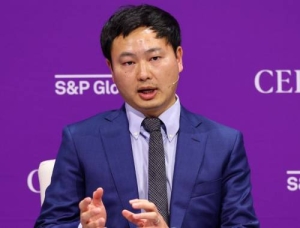
- About
- Education
- Research
- Engagement & Collaboration
- News & Events
Back to Top Nav
Back to Top Nav
Back to Top Nav
Back to Top Nav
During a panel discussion moderated by Etienne Gabel from S&P Global, three academics from leading universities shared their insights on the future of Artificial Intelligence (AI) and its integration into real-world applications. The panelists included John Williams, Professor of Civil and Environmental Engineering at MIT; Anshumali Shrivastava, Associate Professor of Computer Science at Rice University; and Junbo Zhao, Visiting Associate Professor of Engineering at Dartmouth. Together, they explored the evolution and challenges of AI, its educational implications, and its transformative impact on society.
John Williams opened the discussion by highlighting the ubiquity of AI in technology advancements. He explained how neural networks can predict models and identify signals in complex datasets, a technique applicable across numerous fields. However, Williams pointed out the limitations of AI in distinguishing noise from meaningful data, emphasizing the critical role of large language models (LLMs) in predicting linguistic patterns that could be adapted to other data-centric applications. "With AI, you can train networks with trillions of unknowns to isolate the signal," he asserted, underscoring the need for AI to focus on meaningful, practical solutions.
Anshumali Shrivastava continued this thread, noting the unparalleled pace of AI innovation. He expressed concerns over the current educational inadequacies, suggesting that traditional textbooks quickly become obsolete in light of rapid technological advancement. Shrivastava advocated reevaluating AI priorities, especially when dealing with models comprising trillions of parameters. He proposed a philosophical perspective, evoking a Zen-like interrogation of the limits and potential of AI beyond the functions of a typical search engine, emphasizing that community collaboration, as exemplified by Google's evolution, would drive the future of AI.

Junbo Zhao brought the conversation to pragmatic applications, particularly in power systems where specific challenges require nuanced AI integration. He drew attention to the importance of identifying critical security risks and low-probability, high-impact events that AI could anticipate. Zhao asserted that AI applications must be problem-driven to gain market confidence and should be structured around human-centered design principles. He emphasized the necessity of human oversight in AI-facilitated decision-making processes, advocating for AI interventions that enhance rather than replace human judgment.
Reflecting on the educational landscape, Williams discussed the evolution from traditional coding to a new era where AI assists as a co-pilot in programming and prediction. This progression requires teaching future industry leaders to adapt swiftly to innovations in AI technologies. Concurrently, Zhao remarked on the importance of understanding AI predictive outcomes and comprehending the reliability of AI-generated results, which remains a major area of research.
The panel also explored collaborative efforts between academia and industry, particularly in sharing and managing confidential data. Zhao acknowledged the complexities of handling proprietary power data and noted the potential of university-industry partnerships to harness this data effectively. Meanwhile, Shrivastava highlighted the establishment of a new AI major at Rice University, illustrating the institution's commitment to integrating AI into its educational framework and fostering collaborations with startups within the innovation ecosystem.
In conclusion, the panelists agreed that AI's future hinges on its ability to adapt to the evolving demands of society, balancing technological advancements with ethical considerations and human oversight. By fostering interdisciplinary collaborations and continuously reevaluating educational priorities, universities can play a pivotal role in preparing the next generation of leaders to harness AI's transformative power for societal benefit.
CERAWeek is regarded as one of the most influential annual conferences in the energy sector, drawing nearly 10,000 executives, policymakers, investors, entrepreneurs, and scientists from around the globe. Attendees engaged in a week filled with hundreds of discussions, covering topics such as domestic energy production, the influence of AI on energy systems, the rapid deployment of solar energy, the evolving policy landscape, and pioneering carbon capture technologies.
The Irving Institute brought 25 delegates who actively networked with industry leaders and exchanged ideas. Our faculty, staff, and affiliated startups delivered over two dozen presentations throughout the week.